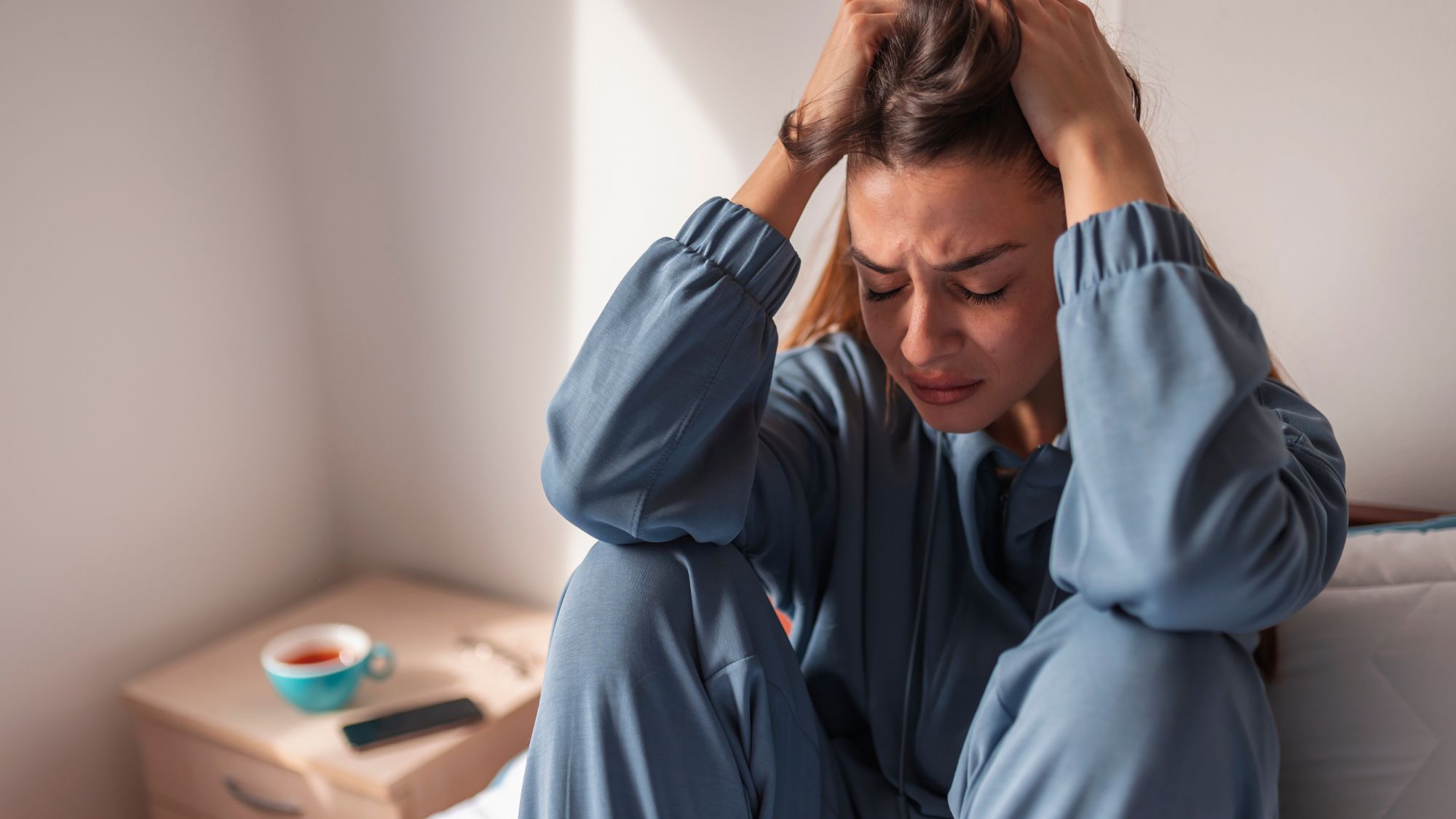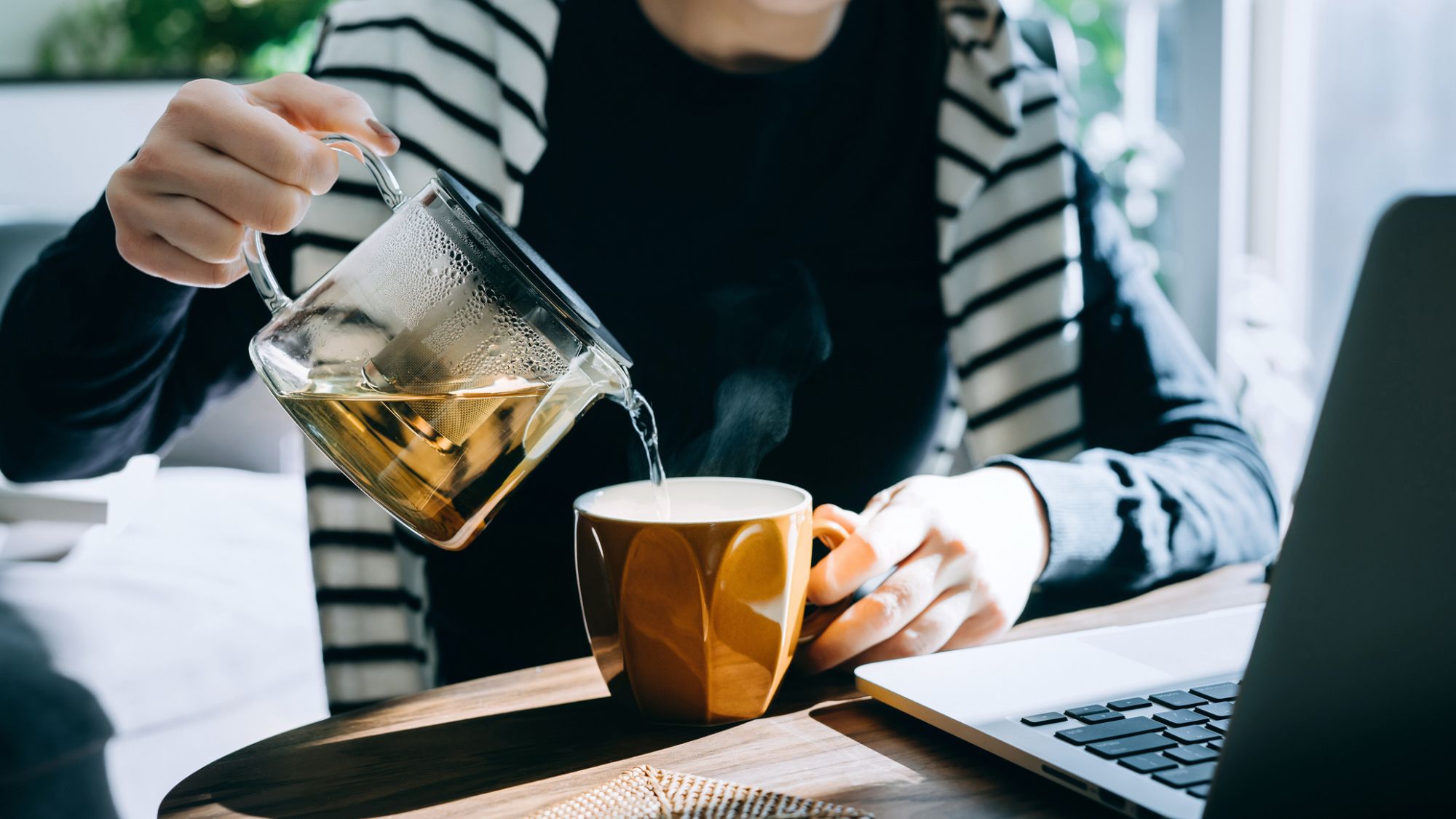
Celebrity news, beauty, fashion advice, and fascinating features, delivered straight to your inbox!
You are now subscribed
Your newsletter sign-up was successful
By now, you're probably all clued up on the signs of stress - you know, sweaty palms, racing heartbeat and constant list of "to-do's" running through your mind - that said, do you know how to reduce stress during particularly challenging times?
We're guessing likely not if you've Googled the term and landed on this article. But fear not - you're not alone in feeling at breaking point, with new stats highlighting that more people in the UK are stressed than ever. One in 14 UK adults (7%) feels stressed every single day, according to CIPHR - which is quite a lot, when you think about it.
That's why we've asked Dr. Lillian Nejad, clinical psychologist and founder of stress app Contain Your Brain, to share her simple formula for how to reduce stress any time, any place. Don't miss our guides to stress eating, how to avoid burnout, and how to manage stress while you're here.
How to reduce stress: your expert-led guide
What is stress?
First things first, it's important to establish what stress actually is. "In short, it's a state of tension that you'll experience both physically and mentally when you face too many demands," shares Dr. Nejad.
As she points out above, stress affects us both physically and mentally, even affecting our behaviours and how we act. Think about it - if you're highly stressed, you're far more likely to snap or react negatively in situations that you may otherwise be able to handle.
What triggers stress?
This one will vary from person to person, she continues. "A whole range of things can cause you to feel stressed - and don't be surprised if they're positive situations, either. For example, events like weddings, holidays, and promotions can sometimes trigger feelings of stress."
She goes on to add that busy times at work, family tension, financial strain, and even having too much to do can all be triggers.
Celebrity news, beauty, fashion advice, and fascinating features, delivered straight to your inbox!
Alongside these external triggers, lifestyle factors including poor eating and sleeping patterns, excessive drug use, or lack of exercise can make you more vulnerable to stress, or at least exacerbate your symptoms, she shares.
11 expert tips for reducing stress
1. Progressive Muscle Relaxation (PMR)
Keen to try the most evidence-based relaxation technique? Then look no further, reassures the expert. "Progressive muscle relaxation - otherwise known as PMR - involves systematically tensing and relaxing the muscles throughout your body leaving you feeling deeply relaxed," she explains.
So, how do they help stress? "Relaxation exercises help induce your "relaxation response" releasing tension from both your body and mind," the expert shares. "Many studies have shown that relaxation therapies help reduce and manage the symptoms of stress and anxiety and enhance overall well-being by slowing down your racing thoughts, distracting you from rumination and overanalysing, and instilling a sense of confidence in your ability to cope in challenging situations. "
Give them a go at Spotify.

2. Get back to nature
Did you know? Nature can not only reduce stress and improve your mental and physical health, but enhance your cognitive abilities, increase your energy, and help you perform better.
"Being in or near green spaces (parks or woods) and blue spaces (ocean or lakes) improves cognitive development and function in children and adults, including attention, working memory and cognitive flexibility," shares Dr. Nejad. "Research suggests spending at least 120 minutes per week in nature in a way that works for you, whether that's all at once or in several short bursts."
Need help with knowing where to start? Our guides to the benefits of walking and the best hikes in the UK might come in handy. Or, give the viral Tiktok Hot Girl Walk a go..
3. Watch an old movie or re-read a book
Yep, you read that right - it turns out turning to old favourites can relieve stress and comfort us.
How so? "We find them relaxing because they're familiar to us," the psychologist explains. "Plus, there's no chance for cortisol-spiking surprises. The comfort, safety and security we feel gives us a sense of control over our emotions and our lives."
4. Create boundaries for your worry time
If you get stressed regularly, then you'll know that with stress comes worry. "When we're stressed, we worry," the expert explains. "All the ‘what ifs’ and ‘if onlys’ come flooding in."
That said, she emphasises that some worry - including both stress and anxiety - can just be a part of day to day life. "They have a purpose - to alert us to potential problems so we can solve them. That said, if you are worrying more than solving, then it’s time to find a better way."
That's where carving out "worry time" comes in - a psychological strategy that helps you create boundaries for your worries. "It works by encouraging you to set aside time to worry, rather than think about it all day."
We know what you're thinking - telling yourself to stop worrying won't work, right? Dr. Nejad agrees, but adds: "If you tell yourself that you will worry about that at 5pm tomorrow, then your brain knows that you've made a time to think about that problem or plan or worry so it can let it go."
Her new app is designed to help you set aside time - available for Apple or Android.
5. Take a break
This one's key, especially if you're up to your eyeballs in stress and don't feel like you have time for yourself each day. "Even five minutes out of your daily grind can be beneficial," stresses the expert.
She also stresses the importance of time away from work to reduce stress levels. "Holidays are good for our mental and physical wellbeing, and help reduce stress, improve our sleep and reduce our risk of heart disease and diabetes," she explains. Why? Well, a change in environment has been found to boost cognitive ability, creativity, and your ability to learn, too.
Remember this: prioritising your mental health and well-being is not selfish, it's an important act of self love. (Self care ideas at the ready).

6. Practice an act of kindness
Did you know? "The research on the benefits of kindness is clear—contributing to others’ happiness actually boosts your own sense of wellbeing both physically and emotionally," she explains.
So, why is this? "When you're kind to another person, the pleasure and reward centres of your brain are activated," she shares. "Your body reacts by producing the feel-good hormones and neurotransmitters (oxytocin, serotonin and dopamine), which lowers your blood pressure, increases optimism, calms you down, and increases your sense of connection to others." Neat.
Read our favourite acts of kindness, here.
7. Hug someone
Another fun fact: studies have shown that humans actually need touch to thrive. Human touch has been found to activate nerves that then signal to your the parts of your brain responsible for reward and compassion, as well as triggering the release of happy hormones including oxytocin, serotonin, dopamine and more.
That's why, if you're wondering how to reduce stress on the spot, one of the simplest things you can do is simply hug someone you love.
"It can benefit us both physically and psychologically," she explains. "The release of oxytocin and the decrease in the stress hormone cortisol when you hug someone not only has a calming effect but can increase your resilience to physical and psychological stressors and decrease our experience of physical and psychological pain."
"Hugging can also regulate your mood, decrease blood pressure and heart rate, improve sleep, and can even strengthen your immunity," she continues.
Wondering how long it takes for a hug to be helpful? Studies researching hugs will often set the time between ten and twenty seconds.
Not a hugger? Try a different form of touch, she suggests. "Try holding hands, a pat on the back, or a massage."
8. Tune in to your inner feelings
Admit it: when we feel stressed or anxious, our instinct is to avoid thoughts, feelings and situations. That said, avoidance brings relief but is short-lived.
Try this: instead of tuning out, tune in, recommends Dr. Nejad. "Tuning is about being mindful - that is, being aware of what’s happening in the moment non-judgmentally."
Try pay attention to how you are feeling, what you are thinking, and what you are doing or want to do, recommends the expert. "It's only when you tune in, that you can really understand yourself," she explains,
If you can tune in nonjudgmentally, you will open new paths to healthier choices and processes that will help you accept the things you can not change and change the things you can.
Breathwork training and meditation might come in handy here, if you struggle to zone out.

9. Ask for help
You'll likely know this, but asking for help is one of the most effective mental health strategies there is.
"If you're struggling, know that help is out there," the psychologist stresses. "Sometimes you can't do it alone and it’s important to open up and share how you are feeling with someone. Asking for help is not a sign of weakness, it's an act of courage. Talk to a friend, a family member, your manager, your doctor, or a mental health professional."
10. Cover the basics
By that, Dr. Nejad means sleep, nutrition, exercise and connection - especially when you're going through a stressful period.
"Aim for seven to nine hours of sleep every night, eat healthy, nutrient-rich foods, drink plenty of water, and move your body daily," she recommends.
Not just that, but make sure you spend time with the people you care about, too. She reckons that fostering social connection is one of the most important ways to safeguard your mental health and reduce stress, adding that investing time with people will enrich your quality of life. But remember - quality over quantity. "Spend time with those who fill your cup up," she adds.
11. Practice good humour
Finally, know that humour is one of the best (and most fun) ways to get through challenging times.
"Laughter and smiling release all sorts of feel-good chemicals in your body which can boost your mood and your resilience. It's a great mood booster, tension diffuser, and social connector," she shares.
"While there isn't one formula for keeping calm that works for everyone but there is a formula that will work for you," she continues. "Don't wait until you're stressed to try to think of strategies. "
When does stress become a problem?
Did you know? Despite popular opinion, not all stress has negative effects, shares the psychologist. "We require some level of stress in our day-to-day to motivate us, achieve goals, and tackle challenges head-on," shares Dr. Nejal.
That said, stress that is too intense, too frequent, and long-lasting has been found to have negative connotations for both our physical and mental health. "Chronic or prolonged periods of stress can negatively impact both your physical and mental health, as well as your overall quality of life," she emphasises.
In other words, if your stress lasts for a number of weeks, do touch base with your GP.

Ally is Marie Claire UK's Senior Health and Sustainability Editor, a well-regarded wellness expert, ten-time marathoner, and Boston Qualifying runner.
Utilising her impressive skillset and exceptional quality of writing, she pens investigative, review and first-person pieces that consistently demonstrate flair and originality.
As well as writing, Ally manages a team of freelancers, oversees all commissioning and strategy for her pillars, and spearheads the brand's annual Women in Sport covers, interviewing and shooting the likes of Mary Earps, Millie Bright, and Ilona Maher. Shortlisted for three BSMEs and winning one in 2022, Ally lives and breathes her verticals: her eye for a story and connections within the wellness sphere are unrivalled. Follow Ally on Instagram for more.
